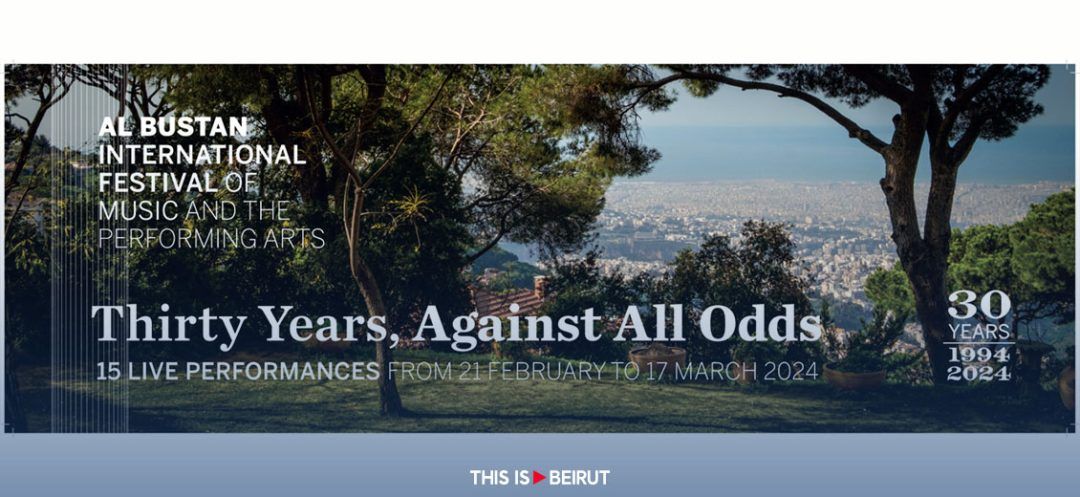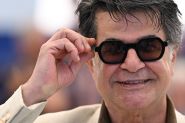
From February 21 to March 17, the Al-Bustan Festival celebrates three decades of existence in an evolving Lebanon. Despite socio-political challenges, the festival persists in illuminating the Lebanese music scene, offering an eclectic program in a country in search of harmony and sensitivity.
From 1994 to 2024, three decades passed, marked by a country in perpetual turmoil, transformation and decay. Today, Lebanon finds itself at a crossroads, faced with complex challenges, a precarious peace and a progressively crumbling status quo, as if the lessons of history had never been assimilated. Despite these challenges, the Lebanese music scene continued to resist, as best as it could, the socio-political storms that ceaselessly rage over the country. From 1994 to 2024, three decades rich in transformations sculpted the local cultural landscape: some festivals, once the very emblems of Lebanon, saw their stars fade, while others shone even brighter. Crowned with thirty years of success, the Al-Bustan Festival firmly ranks among these rare survivors. It managed to preserve its fundamental identity by brilliantly promoting Western art music, while exploring other musical horizons of heterogeneous quality.
Repollinating a Sterile Lebanon
Scheduled from February 21 to March 17, the thirtieth musical season of the festival, titled “Thirty Years, Against All Odds,” promises not only to be a musical celebration, but also a true testament to perseverance through music in a world that is irreversibly dehumanized and insensitive. As Vladimir Jankélévitch (1903-1985) once sanctified, “music is there, on earth, it exists alongside us, like a friend, and the fullness of its evidence gives the courage to live, to write, to continue.” Artists from around the world, these “free” birds in all the semantic richness that this term can encompass, will fly beyond borders to land at the Emile Bustani Auditorium of the Al-Bustan Hotel. Throughout fifteen concerts, these seekers of the sublime will attempt to repollinate a sterile Lebanon through their performances and to shake the sensitivity of people imprisoned in their indifference and hyperindividualism.
Emblematic Operas
The festival thus raises its curtain on February 21 with a tribute to Giacomo Puccini (1858-1924) to commemorate the centenary of his death, through a collection of arias from his most emblematic operas, such as Manon Lescaut (1893), La Bohème (1896), Tosca (1900), Madama Butterfly (1904), La Fanciulla del West (1910) and Turandot (unfinished at his death in 1924, then premiered in 1926). This evening will be an opportunity to revisit the resplendent jewels of his operatic repertoire, including the passionate Un bel dì, vedremo for a lirico-spinto soprano, the moving Nessun dorma for a dramatic tenor (where one cannot help but recall the rich voice of Luciano Pavarotti [1935-2007] and the ecstatic final high A4 in his historic recording of 1972), as well as the melancholic Addio fiorito asil for a spinto tenor, among other exceptional musical moments.
Pianistic Promenade
On February 23 (at the Emile Bustani Auditorium) and February 24 (in Byblos), Italian pianist Giuseppe Andaloro, winner of several piano competitions, including the London World Piano Competition in 2002, will guide the Lebanese audience on a pianistic journey through history. This voyage will start with the Italian Baroque of the 17th century from Girolamo Frescobaldi (1583-1643) and continue up to the Russian post-Romanticism of the 20th century with Sergei Rachmaninoff (1873-1943). This musical journey will include a foray into the heart of heightened Romanticism with Brahmsian and Lisztian colors in the Chaconne in D minor, a piano transcription by Ferruccio Busoni (1866-1924), of the namesake movement from Johann Sebastian Bach’s (1685-1750) Partita No. 2 in D minor, BWV 1004 for violin, as well as the flamboyant virtuosity of Franz Liszt’s (1811-1886) Hungarian Rhapsody No. 12, S. 244/12.
Untamed Passion
On February 27, the festival will present a concert recently considered somewhat cliché (but the untamed passion of Italian bandoneonist, Mario Stefano Pietrodarchi, is undoubtedly worth rediscovering), dedicated mainly to works by Astor Piazzolla (1921-1992), before the real highlight on February 29 with Argentinian pianist Nelson Goerner. He will illuminate the festival with an eclectic program including masterpieces by George Frideric Handel (1685-1759), Robert Schumann (1810-1856), Sergei Rachmaninoff and Mily Balakirev (1837-1910), thus revealing the full richness and musical diversity of his talent. On March 2, a duo of accordion and trumpet will attempt to charm listeners with a sensational repertoire, as scholarly as it is popular. The atmosphere will be visibly imbued with love, with Cupid assuredly present. One should stay on guard, as no one knows who will be struck by his melodious arrows. Never two without three, Édouard Macarez, on the double bass, will join the French duo on March 3 for a concert during which the intoxicating aroma of love will float again.
Return of the Firebird
On March 5 and 6, Russian pianist Boris Berezovsky, one of the leading figures of the classical music scene, much to the displeasure of some, will reign for the tenth time at the pinnacle of the festival. This moment promises to be one of the highlights of this musical season. In 2022, Ici Beyrouth's music critic metaphorically likened Berezovsky to the firebird; this year, the Russian pianist seems to respond with a wink by performing, on March 5, the eponymous work of Igor Stravinsky (1882-1971), alongside other jewels of the Russian and German repertoire, including Ludwig van Beethoven’s (1770-1827) Sonata No. 8 in C minor, Op. 13, known as “Sonata Pathétique.” On the second day, he will share the stage with his daughter, Evelyn Berezovsky, who will tackle a series of pieces from the French Impressionist repertoire of Maurice Ravel (1875-1937) and Claude Debussy (1862-1918). In a grand finale, she will yield the piano to her father, who will let himself be carried away by his bluesy flights.
Healthful Stroll
The blue note will resonate intensely on March 8, magnified by the undisputed talent of the Julian Joseph Trio during a jazz concert that already promises to be exceptional. On March 10, Swedish violinist Daniel Lozakovich and French pianist Alexandre Kantorow will offer an interpretation of a series of four sonatas for violin and piano from the Romantic repertoire, including the imposing Sonata in A minor by César Franck (1822-1890). A musical adventure where each phrase, nuance and intonation must be carefully mastered to bring to life the very essence of the composition. This will clearly not be a healthful stroll. On March 12, enthusiasts of Levantine melodies will have the opportunity to appreciate a repertoire elaborated by the musical ensemble of the Zaki Nassif program from the American University of Beirut, which will hopefully be in line with the requirements of the modal monodic tradition, without succumbing to the trend of deliberate and excessive Westernization of this music.
Final Indulgence
French soprano Julie Fuchs will star at the Emile Bustani Auditorium on March 14, followed by a performance at the Saint Joseph Church of the Jesuit Fathers on March 15, during two lyric music concerts. Because, after all, we all know that virtuosity isn’t just about little coloraturas, right? This champion of the light-lyric soprano repertoire will surely prove that the world of classical music isn’t just a contest of who can trill the highest. A revelation that might raise a few eyebrows. The concert on March 15 will be dedicated to Gioachino Rossini’s (1792-1868) Petite messe solennelle, the “last sin of my old age” in the composer’s own words, performed in its original version but curiously on one piano instead of two. The festival concludes on March 17 in a majestic fashion with the performance of two masterpieces from the classical repertoire: Symphony No. 40 in G minor, K. 550 by Wolfgang Amadeus Mozart (1756-1791) and the Cello Concerto in B minor, Op. 104 by Antonin Dvořák (1841-1904). These musical monuments will be performed by the Lebanese Philharmonic Orchestra, under the enlightened direction of Gianluca Marcianò, accompanied (in the said concerto) by French cellist Victor Julien-Laferrière.
Tickets are available online on the festival’s website, at the festival box office, and at the various branches of Antoine Bookstore, priced at $20, $35 and $50. Students will benefit from a reduced rate, set at $15. The complete program can be viewed online on the official website of the Al-Bustan Festival: https://albustanfestival.com/program-2024/
Read more




Comments